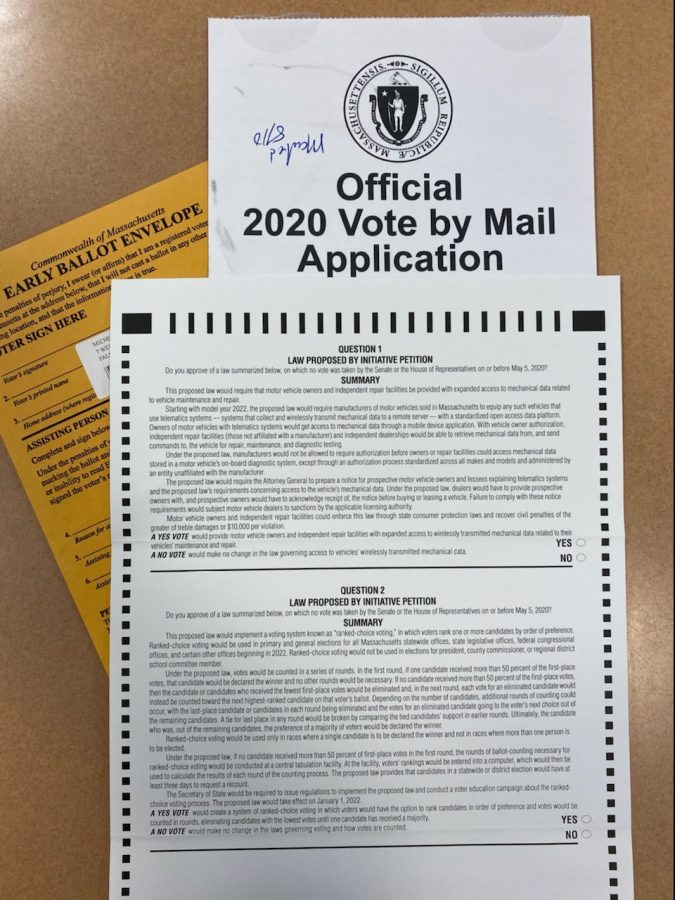Ballot Questions and What They Mean
October 31, 2020
Though a vital part of voting, the ballot questions often don’t get as much attention during a heated presidential election. Though this election is commonly referenced as “the most important election of our lifetimes” and most people are focused on the presidential race alone, it’s still very important to know what the ballot questions are and what they mean for Massachusetts citizens.
The two questions that Massachusetts voterswill be deciding on this year are on Motor Vehicle Mechanical Data, or the “Right To Repair”, and Ranked-Choice voting.
Question one, Motor Vehicle Mechanical Data, or commonly referred to as the right to repair law, gives Massachusetts voters the option to restrict their mechanical data or give expanded access to mechanical data related to the repair and maintenance of vehicles. The Massachusetts Information for Voters booklet said voting yes on question one would give motor vehicle owners and independently-owned auto repair services extended information on motor vehicle data related to the repair and maintenance of the vehicle. This will guarantee that as technology advances, motor vehicle owners can still decide where they want to get their car repaired. A no vote on question one would not change the law regarding the mechanical data of the vehicle. This will keep your motor vehicle data and privacy protected.
Justin Morrison, the owner of Morrison Autoworks, Inc. in Hyannis, referred to question one as a “Pretty straight forward question”. Morrison said “Convenience and choice are the main issues. Convenience for the owner, convenience for the customer, and more choices.” Voting no on question one would continue to limit independently owned repair shops’ access to wireless systems. “It would force people to go to a dealership instead of a cheaper independent business like mine where they may feel more comfortable,” Morrison said.
He mentioned that people come into his shop all the time just to ask about question one and what it means for independent mechanical repair shops like his.
Jay Goodwin, the owner of Hyannis Honda, said that it’s more about the issue of the driving public’s safety. “I don’t expect this to help or hurt dealerships. It’s more about protecting the driving public.” Goodwin said that voting yes on question one could give hackers more access to drivers’ mechanical data. “They could essentially take control of a vehicle.” He also said that companies will most likely benefit from the marketing side of it. “It’s more about them marketing to the driving public,” Goodwin said. When drivers pass or drive by an auto repair shop, they might get a notification right after saying that they need an oil change or need wiper fluid. Because they have access to mechanical data from driver’s vehicles, they can use it to market towards drivers and what their car is in need of. Goodwin said that technology is advancing all the time and more cars are getting more technologically advanced. “It’s concerning,” Goodwin said. “It’s all speculation, but we have the right to know when hackers are trying to get our mechanical data.”
Question two, Ranked Choice Voting, gives Massachusetts voters the option to rank their favorite to their least favorite candidate on the ballot. The Massachusetts Information for Voters booklet said these votes would be counted in rounds. if a candidate receives more than 50 percent of the first-place votes, the candidate would be declared the winner and there would be no further rounds of counting. If no candidate receives more than 50 percent of the first-place votes, then the candidates who received the least amount of first-place votes would be eliminated. If your first choice candidate is eliminated, your vote will transfer to your second choice candidate automatically in the next round of counting. Tischcollege.tufts.edu said “if your top choice turns out to be uncompetitive, your vote will actually transfer to your second choice – as part of a multi-round counting process that helps weed out ‘spoiler’ candidates and ensues winners have a broader base of support.” A yes vote on question two would give Massachusetts voters access to ranked-choice voting in future elections and the votes will be counted in rounds. A no vote on question one wouldn’t change anything within the law that covers voting and how votes are counted in the state of Massachusetts.
Steve Moynihan, who teaches A.P. Government at BHS, said ranked-choice voting gives voters the feeling that their vote matters and is being counted. “The appeal lies in feeling like your vote will count.” Because the votes are counted in rounds, Moynihan said that part of ranked-choice voting can get confusing to voters. However, ranking their favorite to least favorite candidates is easy and appealing to people. He also said that ranked-choice voting will change the way Massachusetts declares winners in an election. Moynihan said that if it’s passed we would be going from a plurality to a majority, where a candidate would have to get 50 percent or more of the votes in Massachusetts to be declared the winner. Moynihan said that ranked-choice voting could bring unintended consequences along with different ways of campaigning. “You could see changes in the way candidates campaign in the future.”
Overall, Moynihan said that voters want their voices to be heard and to vote for a candidate they like instead of casting their vote for a candidate they think has the best chance to win against their opponent.


